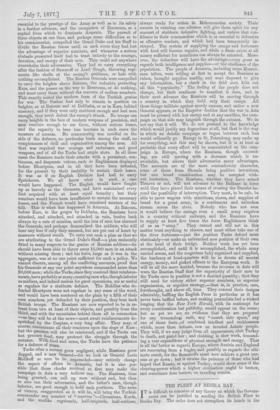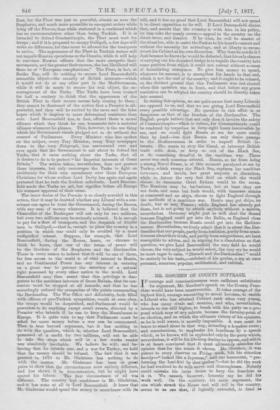THE FLEET AT 13ESIKA BAY.
TT is difficult to conceive of any theory on which the Govern- 1 ment can be justified in sending the British Fleet to Besika Bay. The order does not strengthen its hands in the East, for the Fleet was just as powerful, almost as near the Bosphorus, and much more accessible to emergent orders while lying off the Piraeus, than while stationed in a roadstead which has no recommendation other than being Turkish. If it is intended to defend Constantinople, the Fleet must wait for troops ; and if it is proposed to occupy Gallipoli, a few days will make no difference, for time must be allowed for the transports to arrive. The appearance of the Fleet in Turkish waters will not impede Russian operations on the Danube, while it will help to convince Russian officers that the more energetic their movements, and the greater their success, the less likelihood will there be of " European complications." The Fleet, in fact, at Besika Bay, will do nothing to secure Lord Beaconsfield's ostensible object—the security of British interests—which it would not do at any other port in the Mediterranean, while it will do much to secure his real object, the en- couragement of the Turks. The Turks have been trained for half a century to think that the appearance of the British Fleet in their waters means help coming to them ; they cannot be disabused of the notion that a Premier is all- powerful, and they will be excited by the news and the false hopes which it inspires to more determined resistance than ever. Lord Beaconsfield has, in fact, offered them a moral alliance which they think he can. transmute into a material alliance whenever he pleases. This, however, is the one thing which his Government stands pledged not to do without the consent of Parliament. Every Minister who has spoken on the subject, every Tory Member, every Tory newspaper down to the very Telegraph, has asseverated over and over again that the Government is not about to defend the Turks, that it cares nothing about the Turks, that all it desires to do is to protect "the Imperial interests of Great Britain." The action taken, nevertheless, does not protect those interests, but only encourages the Turks to fight on stubbornly for their own ascendancy over those European Christians for whose welfare Lord Derby has again and again protested that he feels the liveliest solicitude. Lord Beacons- field sends the Turks no aid, but signifies before all Europe his warmest approval of their cause.
The inner desire of the Premier is so clearly revealed in this action, that it may be doubted whether any Liberal with a con- science can agree to trust the Government, during the Recess, with any sum of money whatever. It is believed that the Chancellor of the Exchequer will ask only for two millions, but even two millions may be seriously misused. It is enough to pay for a fleet of transports, and the despatch of 20,000 men to Gallipoli,—that is, enough to place the country in a position in which war could only be avoided by a most undignified retreat. Suppose, for example, that Lord Beaconsfield, during the Recess, hears, or chooses to think he hears, that one of the terms of peace will be the freedom of the Bosphorus and the Dardanelles. There is every reason to believe that it will be one of them, for free access to the world is of vital interest to Russia, and no Continental Power has any interest in entering on a great war to prevent the assertion of a natural right possessed by every other nation in the world. Lord Beaconsfield may then assert that this privilege is dan- gerous to the maritime interests of Groat Britain, that its con- cession must be stopped at all hazards, and that he has accordingly ordered the occupation of the points commanding the Dardanelles. The War Office and Admiralty, both filled with officers of pro-Turkish sympathies, would at once obey, the troops would be despatched, and. Parliament would be powerless to do anything except await events, directed by a Premier who intends if he can •to keep the Mussulmans in Europe. It is quite vain to say that Parliament must be asked for more money before a war can be commenced.
That is true beyond argument, but it has nothing to do with the question, which is, whether Lord Beaconsfield, possessed of a credit for two millions, will not be able to take the steps which will in a few weeks render war absolutely inevitable. We believe he will; and be- lieving that he intends war, and a war for Turkey, we hold that the money should be refused. The fact that it was granted in 1870 to Mr. Gladstone has nothing to do with the matter. Mr. Gladstone has been at great pains to show that the circumstances were entirely different, and has shown it to demonstration, but he might have spared his labour. The first circumstance of all was different. The country had confidence in Mr. Gladstone, and it has none at all in Lord Beaconsfield. It knew that Mr. Gladstone would spend the money in accordance with N will, and it has no proof that Lord Beaconsfield will not spend it in direct opposition to its will. If Lord Beaconsfield denies that, and asserts that the country is with him in his policy, let him take the manly course,—appeal to the country on the direct issue, and dissolve. If he wins, he will be master of the situation, able to assist the Pashas to his heart's content and without the necessity for subterfuge, and at liberty to recon- struct his Cabinet at his own discretion. Why does he not do it Just because he knows he would be defeated, that his only chance of carrying out his cherished design is to beguile the country into some position from which it could not retreat without a sense of humiliating annoyance. To give him money to spend, whatever its amount, is to strengthen his hands to that end, which is not the end of the country; and it ought to be refused, on the distinct ground that this Parliament was not elected when this question was in front, and that before any grave resolution can be adopted the country should be directly taken into counsel.
In stating this opinion, we are quite aware that many Liberals are opposed to us, and that we are giving Lord Beaconsfield every possible advantage. No question in this affair is so dangerous as that of the freedom of the Dardanelles. The English people believe that not only does it involve the safety of Constantinople—which is untrue, for Constantinople could be rendered by torpedoes in forty-eight hours inaccessible by sea, and we could fight Russia at sea far more easily than by land—but that Russia can only desire passage to the Mediterranean in order to imperil British in- terests. She wants to stop the Canal, or intercept British trade with Asia, or keep us out of the Black Sea, or do something dreadful in the maritime way. There never was such nonsense uttered. Russia, so far from being a strong. Naval Power, is at this moment paralysed at sea by Turkey, which sweeps the Black Sea, captures her maritime fortresses, and insults her great seaports at discretion, while in future the very last field on which she would choose to encounter Great Britain would be the ocean. The Russians may be barbarians, but at least they are not fools, and none but fools would, with immense armies at command and no ships, choose to fight England through the methods of a maritime war. Russia may get ships, no doubt, but so may Prance ; while England has already got them, but is not going to attack anybody without a motive, nevertheless. Germany might just as well shut the Sound because England could get into the Baltic, as England close the Dardanelles because Russia could get into the Mediter- ranean. Nevertheless, we freely admit that it is about the Dar- danelles that our people, partly from tradition, partly from sensi- tiveness about their trade, and partly from misguidance, are least susceptible to advice, and in arguing for a dissolution on that question, we give Lord Beaconsfield the very field he would choose, the very subject he would select, the very cry he would be most eager to raise. " Disraeli and the Dardanelles I " would be entirely to his taste,—redolent of his genius, a cry at once personal, sonorous, popular, antithetical, and rubbish.



































 Previous page
Previous page